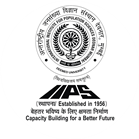- About IIPS
- Academics
- Study @ IIPS
- Departments
- Centres
- Controller of Examination
- Programme
- Distance and Online Education
- Training
- Facilities/Services
- Resources
- Virtual Learning
- Digital Initiatives (MHRD)
- Notice
- Seminars / Workshops / Conferences
- Conferences
- Publications
- Seminars
- Sponsored Research
- Workshops
- Collaboration
- National
- International
- NEP 2020
- Admission
- Courses
- Admission Bulletin
- TIME-TABLE For Admission 2025-26
- Model Question Papers
- Programme Coordinators
- Fellowships
- Academic Calendar
- International Students
- Visa Information
- Administration
- Faculty & Staff
- Research & Publications
- Library
- Information
- Right to Information
- Vigilance Officer
- Annual Report
- Director's Report
- Cells & Commitees
- Cells
- Commitees
- Committees of NEP 2020
- Staff Walfare Committee
- Cultural Committee
- Internal Committee
- Purchase Commitees
- Students Academic Committee
- Student Research Ethics Committee
- Anti-Ragging Committee
- Institutional Review Board
- Social Media Committee
- Prevention of Caste-based Discrimination Committee
- Code of Conduct and Professional Ethics
- National and International honours, Awards, Recognition, and Medals
- Online Facilities
- Employee's Corner
- Memorial Lectures
- Convocation
- IIPS Newsletters
- COVID 19 Information
- Life @ IIPS
Nutritional and Disease Challenges of Children in India's Flood-Prone Regions: A Comparative Assessment
- Home
- Nutritional and Disease Challenges of Children in India's Flood-Prone Regions: A Comparative Assessment
Abstract Content (not more than 300 word, should include: Introduction, Objective, Methodology, critical findings & Conclusion):
India faces a growing challenge of natural disasters and public health crises, particularly in flood-prone regions, where children under the age of five are highly vulnerable to malnutrition and disease. This study examines the impact of recurring floods on child health using data from the National Family Health Survey-5 (2019-21) and flood reports from the Central Water Commission (2018-2021). A total of 84 districts were identified as flood-affected, and key health indicators—including stunting (height-for-age), wasting (weight-for-height), underweight prevalence (weight-for-age), and diarrheal incidence—were analysed to assess disparities between flooded and non-flooded regions. Findings reveal that children in flood-affected districts experience higher rates of malnutrition and disease than the national average. The prevalence of severely wasted children in flood-affected areas (mean: 8.15%) exceeded the national average (7.56%). Similarly, stunting (35.15% vs 33.53%), underweight prevalence (32.23% vs 29.56%), and wasting (20.10% vs 18.58%) were all higher in flooded districts. Moreover, diarrheal prevalence among children under five was significantly elevated in flood-prone areas (8.22%) compared to the national average (6.54%). The study also found a stronger correlation between inadequate sanitation, unsafe drinking water, and diarrhoea prevalence in flood-affected regions (R² = 0.26) than across all Indian districts (R² = 0.13), highlighting the role of poor infrastructure in worsening child health outcomes. Recurrent flooding worsens food insecurity, disrupts clean water access, and heightens children's vulnerability to malnutrition and disease. Urgent interventions—disaster-resilient infrastructure, healthcare improvements, and maternal education—are crucial to mitigating the long-term health impacts of floods on children in India’s vulnerable regions.
Abstract theme:
In case of not been selected for oral presentation, do you want to be considered for the poster presentation ?:
No
Do you require financial support to attend the seminar ? (Not applicable for virtual meet):
Yes-full
Gender:
Male
Evaluation Status:
No
